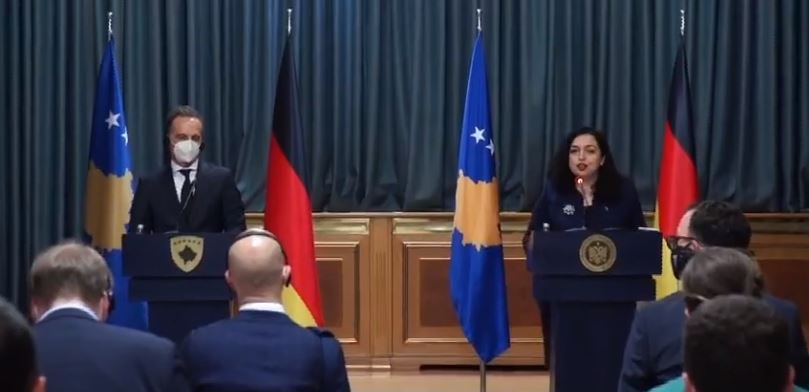
Border changes in the Balkans are dangerous and suggestions to redraw them should be part of the past, German Foreign Minister Heiko Maas stated from Kosovo on Thursday.
“Let me make it clear that the ideas that have been expressed recently that complex social and political issues can be solved by drawing lines on maps, we consider them not only unrealistic but also extremely dangerous, and we simply consider dangerous even the discussion about those ideas,” Maas said during a press conference with President Vjosa Osmani in Pristina on Friday.
It follows media rumors in the region of an alleged proposal presented to EU institutions suggesting the need for the redrawing of borders in the Balkans along ethnic lines.
Maas is visiting Pristina today, with meeting planned with the highest officials. On Friday, he is set to visit Belgrade.
He stressed Germany’s support for Kosovo on the process of dialogue with Serbia.
“I have emphasized our unconditional support for the dialogue for the normalization of relations between Kosovo and Serbia moderated by the EU and I have heard topics that are important to the people of Kosovo,” he said.
Speaking of the dialogue with Serbia, Osmani said Kosovo has been engaged in it from the beginning and offered cooperation, despite Serbia’s refusal to “apologize for the crimes committed in Kosovo”.
She added that Kosovo will continue to ask for justice for victims of the war with Serbia.
“For us, this dialogue process needs a reset, so it is not just a continuation and all our institutions will carefully review each agreement reached, each document reviewed so far and we will develop a dialogue based on clear principles,” Osmani said.
She stated that Kosovo expects this process to end with mutual recognition
“The Republic of Kosovo will in no way accept to enter into dangerous adventures that have to do either with border changes- a logic that belongs to the last century- or with the change of the constitutional regulation which would endanger our internal functionality,” Osmani said.
One of the main topics discussed between Osmani and Maas was the COVID-19 pandemic situation and the related support from Germany.
Osmani said citizens expect institutions to first deal with managing the pandemic and its economic consequences.
“The European Union has prepared a support package for the countries of the Western Balkans in the amount of 12 billion euros and now it happened that this year we will take over the role of host of the so-called Berlin Process which includes 6 countries of the Western Balkans,” Maas said, ensuring Osmani about their efforts to support Kosovo.
Commenting on visa liberalization for Kosovo, Osmani stated that citizens are disappointed with the EU for having been left the only country in the region with a visa regime for the Schengen area.
“The position of the German government is very clear, that Kosovo has met all the criteria for visa liberalization. It is also a matter for the EU to fulfill the promise it has made and during our EU presidency we have put this issue at the top of the agenda. We will be committed to visa liberalization as soon as possible,” Maas said.

